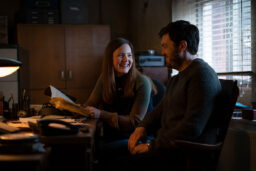Robin’s Challenges and Changes
‘Both women had been touched by violence and sadism. Lucy had reacted by burying herself where she hoped it would never reach her again; Robin, by facing it almost daily, investigating and resolving other crimes and traumas, driven to do so by the same impulse to actively disentangle complications and disinter truths that Strike recognised in himself.’
Lethal White, Robert Galbraith
Unlike Lucy, Strike’s sister, Robin enjoyed a stable, middle-class upbringing in North Yorkshire, but that has not shielded her from challenges, both personal and professional, which would have stopped other people in their tracks.
However, as the agency’s investigations into the Universal Humanitarian Church begin (The Running Grave), Robin has a place of her own and is finally in a relationship with someone who understands her work, and a full partner in the agency with her name on the door alongside Strike’s.
Here we take a look at some of the challenges Robin has had to face, and you can hear Robert Galbraith talking about the changes Robin has gone through here. But could anyone be ready for what going undercover at the UHC will entail?
The Attack
‘Later there had been days and weeks when she had felt as though she had in fact died, and was trapped in the body from which she felt entirely disconnected. The only way to protect herself, it had seemed, was to separate herself from her own flesh, to deny their connection. It had been a long time before she had felt able to take possession again.’
Career of Evil, Robert Galbraith
For many weeks after the attack that led to her leaving university, Robin was unable to leave her room, which makes coming to live with her fiancé Matthew in London an achievement in itself. Then a mistake at the temping agency which means she is sent to work with a private detective with a messy personal life, living in his office, offers her the chance to rediscover her ambition to investigate, and reclaim a vocation which had appeared lost to her.
Robin was able to testify against her attacker. Her ability to observe details did not desert her even in extremis and allowed her to identify the man who attacked her and aid in his conviction. She also slowly overcame the agoraphobia, which marked the weeks and months following the attack, taking advanced driving courses to get her out of the house. The courses end up saving her life, and Strike’s, on a long and snowy drive to Tiverton (The Silkworm) when their hire car is almost wiped out by a jack-knifing tanker on the motorway.
Robin insists the attack does not define her, but it has shaped her life. It led to her leaving university, but also set her on the path which led to the agency. Also, as Strike sees quickly, and Robin comes to accept much later, it means she stays with her boyfriend Matthew far longer than she would otherwise have done. He seemed to her, for a long time, the safest man in the world, and though, after their short and disastrous marriage, Robin is prepared to admit he would be a good father and is not devoid of kindness, she realises their relationship was built on a fundamental misunderstanding of both her needs, and his.
The Love Life
‘You liked it, you liked me being stuck at home, why can’t you admit it? Sarah Shadlock at uni and me underachieving back in Masham – it made up for me getting better A-levels than you, getting into my first choice of—’
Lethal White, Robert Galbraith
‘Oh!’ he laughed humourlessly, ‘oh, you got better fucking A-levels than me? Yeah, that keeps me up at night—’
‘If I hadn’t been raped, we’d have split up years ago!’
Though Robin shows she has aptitude and appetite for the work as soon as she joins the agency, Strike can see during their investigation into the disappearance of Owen Quine, (The Silkworm) that she is torn between keeping Matthew happy, and devoting the time to the job that it requires. Strike warns her that some people, such as Matthew and his own ex-fiancée, Charlotte, can’t understand a vocation, and she’ll have to work out how to manage the workload of being his partner alongside her relationship. It continues to be a struggle, with Matthew unable to control his jealousy of Strike and resentment of her job.
After Robin leaves Matthew, finally admitting the relationship has failed when she discovers he’s been cheating on her with his university friend, Sarah Shadlock, Robin’s cousin Kate says she seems to be travelling in a different direction to many of her friends. Kate insists she means more free, and though Robin is relieved she no longer has to deal with Matthew’s sulking silences and insecurities, the remark hits her hard. As she deals with divorce, a new housemate and her twenty-ninth birthday (Troubled Blood), she is also beginning to understand the potential for loneliness that comes with a single, driving passion. She can also admit to herself how deep her feelings for Strike run but is determined for the good of their friendship and the business to suppress them.
During the search for the killer of Edie Ledwell the following year (The Ink Black Heart), Robin meets Ryan Murphy, a CID officer, handsome and intelligent, who asks her out. Still confused and frustrated by her feelings for Strike, Robin agrees and by the time the agency’s investigations into the Universal Humanitarian Church begin (The Running Grave), Robin and Ryan have been together eight months. Ryan understands investigative work, which means Robin feels she can expect a level of understanding from him which Matthew could never offer. There is still an element of guardedness in their relationship, but for the time being though a private life free of jealous rows and grinding resentments makes a very nice change.
When it becomes clear someone from the agency will have to join the UHC undercover, a job which might last several weeks, Robin has no doubt about insisting it should be her, no matter how happy she is with Ryan. She is proud of the fact she’s never had a cover broken, and has been interested in mind control ever since she studied it at university. A long period undercover might well put a strain on her relationship with Ryan, but she is not willing to compromise on her vocation any longer. When Ryan realises how long she will be gone for though, Robin finds this relationship too might have challenges.
PTSD
‘How long have you been having panic attacks?’ he asked conversationally.
Lethal White, Robert Galbraith
There seemed no point dissembling any more.
‘About a year,’ she muttered. ‘Been getting help with them?’
‘Yes. I was in therapy for a bit. Now I do CBT exercises.’
‘Do you, though?’ Strike asked mildly. ‘Because I bought vegetarian bacon a week ago, but it’s not making me any healthier, just sitting there in the fridge.’
Though Robin has escaped the shadow of the attack which ended her university career, a terrifying encounter with the Shacklewell Ripper just before her marriage has left her with panic attacks. These sharp-edged fragments of recollection, which plunge her into past moments of violence, have driven her into therapy. She has found the Cognitive Behavioural Therapy exercises helpful, but seeing her therapist feels unpleasantly like spending time with yet another person who thinks they know what is best for her. Her therapist leaves long silences and challenges her on the smallest things, just like her husband and mother. Still, as she tells Matthew, therapy has taught her how to tell the truth.
For months she tries to hide her panic attacks from her husband and Strike. It is only when she has left Matthew, and an attack while driving forces her and Strike onto the motorway hard shoulder she confesses to her partner something of what she has been going through. Instead of telling her she’s not fit for work, as she feared, Strike tells her about the panic attacks he had getting into cars after the explosion which cost him his leg. His difficulties haven’t disappeared, he tells her, it’s simply Robin hasn’t noticed because he trusts her more than any other driver he knows.
As their investigations into the Chiswell family conclude (Lethal White), Robin is doing her CBT exercises diligently and finding them helpful. And Strike only asks if she is keeping up with them once a week.
Men at Work
‘And then you walk out, and leave me to—’
Troubled Blood, Robert Galbraith
‘Well,’ said Strike, ‘by the sounds of it, the sooner I left, the bett—’
‘Better for you,’ she said, advancing on him, her teeth bared: he’d never seen her like this before, ‘because you got to dump all your aggression at my house, then walk out and let me clean up your fucking mess, as per usual!’
Robin has learned her trade from Strike and is grateful, but his generally abrasive style means she has adopted the role of the conciliator in the office, just as she has done in the past in her family and her marriage. Even after her divorce, she is the one who says please and sorry, excusing Strike’s bad moods, while he doesn’t give a toss. With their contractor, Saul Morris, she is also placatory, laughing at his unfunny jokes in the same way she used to laugh at Matthew’s as Morris tests her boundaries, as a boss and a woman.
Both men push her beyond the limits of her patience during the investigations into the disappearance of Margot Bamborough, (Troubled Blood). After a disastrous dinner with Strike, her flat mate, and her younger brother, Robin does not hold back and Strike, shocked by her aggression and chastened, apologises and tries to do better. Saul also finds himself without support in the office when he is eventually violently, if accidentally, checked.
‘Matthew was always trying to guilt me out of this career: I didn’t earn enough, I worked too many hours, I took too many risks … but I love it,’ said Robin, with a trace of fierceness, ‘and I don’t want to apologise for that any more …’
Troubled Blood, Robert Galbraith
Robin recognises and accepts the challenges of doing a demanding, occasionally dangerous job for minimal pay, and the personal challenges she has faced have demonstrated and honed her resilience, resourcefulness and self-reliance.
Though she is now living on her own, and in a happy and committed relationship, it quickly becomes clear she will need to draw deeply on that strength during the long weeks working undercover at the UHC.




